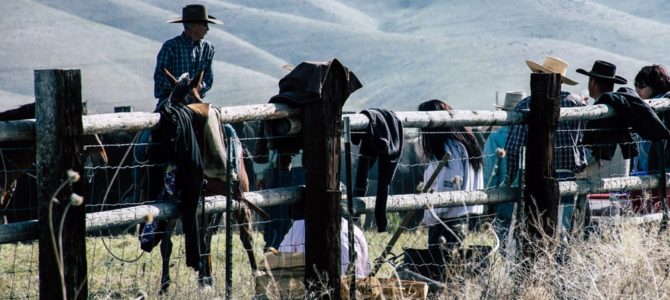
When I was young, a cowboy with a pony trailer used to turn up occasionally to take pictures of tykes old enough to hold onto a pommel. It was something you did once, creating a family keepsake. But you would be hard-pressed to find a picture of me as young boy without a cowboy hat, boots, and toy (but steel) six-shooters.
No pony trailer ever turned up for my kids, so I imagine that tradition is long gone, which is too bad. To my mind, the disappearance of the pony man and the milk man and the helpful gas station attendant (remember them?) mark the vanishing of something valuable in American life, something that helped create community, that now much-abused word.
The bigger community that appears to be unraveling is America itself, in part because of the Left’s identity politics—where the only unity is found in opposition to the able-bodied, white, “cisgender-male” Christian patriarchy—and in part because of the Left’s war on the idea of a common, patriotic American history.
I grew up in San Diego, a Navy and Marine Corps town. Many of my teachers were former officers or the wives of officers. Still, in elementary and junior high school I learned more about Crispus Attucks than I did about George Washington at Trenton; more about Harriet Tubman than about Jefferson Davis’s presidency in Richmond.
Up to a point, it was soft-soap political correctness, but all very well-meaning, without finger-pointing. Indeed, we were taught that the causes of the Civil War were obviously manifold, not just slavery, and no one, student or teacher, was so crazy as to conflate the Southern Confederacy with national socialism. Instead, the shared attitude was that of Theodore Roosevelt:
The great Civil War, in which Lincoln towered as the loftiest figure, left us not only a reunited country, but a country that has the proud right to claim as its own the glory won alike by those who wore the blue and by those who wore the gray, by those who followed Ulysses Grant and by those who followed Robert E. Lee, for both fought with equal bravery and equal sincerity of conviction, each striving for the light as it was given him to see the light; though it is now clear to all that the triumph of the cause of freedom and of the Union was essential to the welfare of mankind.
Equally important, if not more so, as the history I learned in the classroom was what I imbibed outside of it. When “Gone with the Wind” re-aired on national television back then, everyone watched it (and girls read the book). Most Westerns, popular in the 1960s and into the early 1970s, featured sympathetic former Confederates, and some films—like “The Undefeated” (John Wayne and Rock Hudson, 1969) and “Major Dundee” (Charlton Heston and Richard Harris, 1965)—centered on Federals and Confederates uniting against a common enemy.
Traveling around the country and seeing Confederate names crop up was once a piquant reminder of the past, and you didn’t have to travel far, even in San Diego. Until recently there was a Robert E. Lee elementary school in my hometown and another in Long Back, California, a marker honoring Jefferson Davis in San Diego’s Horton Plaza, and a plaque in California’s Hollywood Forever Cemetery, “In memory of the soldiers of the Confederate States Army who have died or may die on the Pacific Coast.” These are apparently all so offensive now that they have been effaced. The dead cannot be honored, because the living are ashamed of our past.
To say the least, this is not a healthy state of affairs, and the hollowing out of our past, the emptying of our hall of heroes, is not a random thing. It is driven by Jacobins who want to replace our history with something else—a falsified, political, agitprop version. If you ever meet a millennial and fear for the future, this is probably why. Many of them know nothing of the past except that it was bad, the dark ages extending from man’s emergence from the slime until around 2008 and then returning again in 2016.
This sort of indoctrination was harder to pull off in my day, in part because of the man with the pony trailer. A steady diet of westerns tied kids to the past. Most of us had a triumphant idea of the winning of the West, which easily coincided with admiration for the Indians, something Americans have always had, even before James Fenimore Cooper. The Lone Ranger wasn’t the only one to have an Indian sidekick. Even I, the junior cowboy, had kachina dolls on my window sill, a stout wooden tomahawk (that could have done some real damage), Indian war paint to disguise my paleface features, and lived in a house full of Indian rugs.
Cicero said that not to know the past is to remain forever a child, but that’s not true. Children have a sense of wonder. They have imagination, from which comes empathy. They are curious. They want to learn. If the present culture is intent on trying to make Little Red Guards of them, we need to redress the balance.
The remedy is actually easily found in older books and movies, and has certain advantages. The old stories are better, aren’t nearly so preachy, and, best of all, they’re true, truer to human nature and truer to real history.
Elections are vitally important, but the real victories in culture and politics are won by shaping the imagination of each rising generation. As patriots, one of the best things we can do for our country is to dust off our old heroes, restore their statues to their plinths, and recognize that, as in the Renaissance, the way forward lies in recapturing an heroic past, a past, that, in our case, includes men with spurs on their heels.









